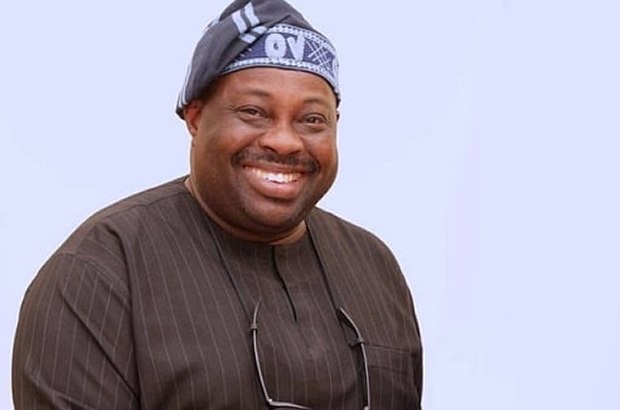By Segun Adeyeye
Seest thou a man diligent in his business? he shall stand before kings; he shall not stand before mean men – Proverbs 22:29
On the 16th of May 2023, Chief Dele Momodu, an accomplished Journalist, Publisher, global media entrepreneur, pro-democracy activist, presidential aspirant and mentor to many clocked 63 years on earth.
The story of this great and iconic son of Africa affectionately called ‘BOB DEE’ by his friends and teeming admirers is the stuff of legends.
Born to barely literate parents, Dele Momodu studied Yoruba language as an undergraduate and did his post graduate studies in Literature in English, both at the prestigious University of Ife (now Obafemi Awolowo University).
His unique mastery of the English language saw him secure early jobs as private secretary to the late Deputy Governor of the old Ondo State, Chief Akin Omoboriowo and public relations officer to the late Ooni of Ife, Oba Okunade Sijuwade at different times.
When the allure of Lagos came calling, as a young up coming Journalist, Dele took abode in the relatively sleepy Adigboluja in the Ojodu Abiodun area of Lagos, a community in which this writer also lived briefly as a teenager.
His prodigious talent quickly saw him engaged as an editor of the then wave making Weekend Concord; one of the titles on the staple of Concord Newspaper Group owned by the late Chief MKO Abiola. It was from this platform that Dele Momodu metaphorically took lifestyle journalism by storm.
He brought so much panache to that genre of print journalism and gravitas to the office of editor that other higher responsibilities soon came calling.
There is a saying among the Yorubas that a child that knows how to thoroughly wash his hands will soon start dining with the elders; Such was the story of the then young and budding journalist that he soon came into the attention of Chief MKO Abiola the Newspaper’s proprietor. The story of the Father-Son relationship that Chief Abiola and Dele Momodu went on to build has been well documented; to the extent that on the day of his wedding in 1992, his new bride, Mrs Mobolaji Momodu was handed over to Chief Abiola as Dele’s Father. He also once ran Chief Abiola’s wonderloaf Bakery amidst other engagements usually reserved for trusted lieutenants.
When Chief Abiola went into politics and contested the June 12 1993 presidential election, naturally his much beloved son Dele became one of his political footsoldiers. The unfortunate annulment of that historic election and the ensuing battle to reclaim the mandate freely given to Chief Abiola by Nigerians brought out the activist in Dele Momodu. Soon enough, his uncompromising stance would make him a prime target for the military junta who hounded him everywhere until he had to take refuge in exile, from where he alongside other pro-democracy activists like Professor Bolaji Akinyemi, Gen Alani Akinrinade,(Rtd) Air Commodore Dan Suleiman (Rtd)Senator Bola Tinubu late Chief Anthony Enahoro and others waged a ferocious battle against the military that culminated in the birth of the democratic rule being enjoyed by Nigerians today in 1999.
As the saying goes; when life throws you a lemon, you should endeavour to make a lemonade out of it. Such was the case with Dele Momodu who with his wife and young family bore the brunt and hardships of life in exile in the early days of their marriage.
While in exile in the UK, the idea of a global celebrity magazine to truly celebrate great accomplishments by Africans from all spheres of endeavors began to take root his ever fecund mind; enter Ovation Magazine International. The little acorn that was Ovation Magazine has now become a giant oak tree with other spin off businesses and tentacles all over the world.
Despite his hyper busy schedule manning his chains of business interests, the writer in Dele Momodu still finds time to write what should rank as one of the longest running columns in any Nigerian Newspaper; the PENdulum on ThisDay Newspaper on Saturdays.
One enduring quality that has greatly endeared the celebrant to this writer is his fidelity to friendship and ever readiness to acknowledge everyone who has played one positive role or another in his journey to the top no matter how seemingly negligible. When he clocked 60 in the year 2020, for weeks his back page column in ThisDay and his The Boss online Newspaper were yielded to acknowledging and celebrating this long list of ‘who is who’ in his still evolving great story.
This writer was also deeply touched on one occasion watching Chief Momodu not being able to hold back his tears on a live television interview once the subject veered in the direction of Chief MKO Abiola and the harrowing experience he went through in military detention while trying to claim his mandate culminating in his unfortunate death. Such has been his loyalty to his mentor and his legacy even in death.
Chief Momodu’s recent forays into Nigeria’s presidential politics may not have met with the expected success, but let no one be left in doubt that he is still poised to play a major role in the evolution and development of his great country.
In his book; How Countries Compete: Strategy, Structure and Government in the Global Economy, Richard H.K..Victor alluded to the stiff competition going on in an increasingly globalized world and how imperative it is for countries to develop strategies to compete for the markets, technologies and skills that will raise their standards of living.
Notably, for Nigeria to survive in this cauldron of competition, the role of global branding and strategic positioning experts like Dele Momodu simply cannot be overemphasized.
So for this great Nigerian, in the annals of our political, economic leadership and development as a nation, his day in the sun is still looming large ahead.
Suffice now to join his beloved wife of over three decades, four Sons, extended family members and well wishers all over the world to say;
HAPPY 63RD BIRTHDAY BOB DEE
As your days, so shall your strength be in Jesus Name (Amen).
Adeyeye is a Lagos based Corporate Lawyer and Content Developer (segunadeyeyeceo@yahoo.com)

 News6 years ago
News6 years ago
 Featured6 years ago
Featured6 years ago
 Boss Picks6 years ago
Boss Picks6 years ago
 Headline6 years ago
Headline6 years ago
 Headline6 years ago
Headline6 years ago
 Headline5 years ago
Headline5 years ago
 Headline6 years ago
Headline6 years ago
 Headline6 years ago
Headline6 years ago














